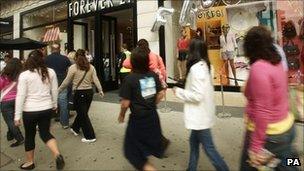UK retail sales see weak growth in July
- Published

More consumers are cutting back on their spending
Retail sales grew only slightly last month, as cash-strapped consumers remained under pressure, figures show.
Sales volumes excluding petrol rose just 0.2% in July, a slowdown on the 0.8% increase in June, said the Office for National Statistics (ONS).
Sales of household goods, clothing and footwear all declined.
Consumer spending continues be affected by a number of factors, including higher inflation, job losses and limited wage rises.
Inflation in July, as measured by the government's preferred Consumer Prices Index, increased to 4.4% from 4.2% in June. This is more than double the 2% target rate.
Meanwhile, the number of people unemployed in the UK rose by 38,000 to 2.49 million in the three months to June.
'Disappointing' data
Compared with July 2010, sales volumes excluding fuel were also 0.2% lower. When fuel sales are included sales were unchanged from a year ago.
The sales volumes data is adjusted by the ONS to remove the effect of inflation.
When the impact of inflation is included, sales in July rose in value terms by 0.8% from June, and by 4.3% from a year earlier.
The 0.2% rise in volume retail sales in July was less than the 0.3% increase expected by analysts, and was also lower than the 0.6% increase estimated by the British Retail Consortium earlier this month.
The ONS said volume sales of clothing and footwear fell 0.3% in July compared with June, with household goods declining by the same amount. Food sales were up 0.7%.
Since the start of the year a number of well-known retailers have gone into administration, including fashion chain Jane Norman, interior designer Habitat, and wine seller Oddbins.
Others such as Mothercare, entertainment group HMV and confectioner Thorntons have announced store closures.
David Kern, chief economist at the British Chambers of Commerce, said the latest official figures were "broadly as expected".
He added: "While disappointing, it is not surprising given the huge squeeze on disposable incomes as a result of higher food and energy costs and the government's austerity measures.
"These figures and other economic indicators suggest growth in the third quarter of this year is likely to remain sluggish, although fears of a new recession seem exaggerated."
George MacDonald from Retail Week says people are still buying "flashy" goods like iPads
'Limping along'
Nida Ali, economic adviser to the Ernst & Young Item Club, said the latest data was "more encouraging than expected".
She added: "Monthly sales growth was much weaker than June but, given that retailers had started their sales earlier than usual this year, any growth at all in July is very welcome, particularly in the current climate."
Investec analyst Victoria Cadman said UK consumers were "limping along at best".
"What leaps out is that consumers are unwilling to spend on big ticket items - household goods are down 4.1% on the year," she added.
"The outlook for retail does not look particularly rosy, concerns about the growth outlook and the decline in real wages are weighing on the consumer."
The UK economy grew by only 0.2% in the second quarter of the year, down from the 0.5% growth rate recorded between January and March.